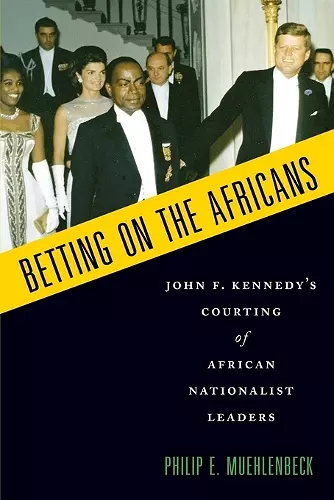Betting on the Africans
John F. Kennedy's Courting of African Nationalist Leaders
Format:Paperback
Publisher:Oxford University Press Inc
Published:15th May '14
Currently unavailable, and unfortunately no date known when it will be back
This paperback is available in another edition too:
- Hardback£105.00(9780195396096)

As a presidential candidate, John F. Kennedy established a reputation across Africa as a sympathetic supporter of African nationalism, who if elected would realign Washington's priorities toward the continent. Once in office, Kennedy indeed made changing the image of America in Africa a top priority of his administration, believing that the Cold War could be won or lost depending upon whether Washington or Moscow won the hearts and minds of the Third World. Africa was particularly important because a wave of independence saw nineteen newly independent African states admitted into the United Nations during 1960-61. By 1962, 31 of the UN's 110 member states were from the African continent, and both Washington and Moscow sought to add these countries to their respective voting bloc. Kennedy feared that neglect of the newly decolonized countries of the world would result in the rise of anti-Americanism and needed to be addressed irrespective of the Cold War. Philip Muehlenbeck demonstrates how Kennedy used all means at his disposal-economic, cultural, personal-to appeal to the leaders of the developing world, including Nkrumah, Senghor, Touré, Nyerere, and Ben Bella. Drawing on archival sources from Africa, the United States, and the United Kingdom, Muehlenbeck closely examines Kennedy's policies towards Guinea, Ghana, Ivory Coast, Liberia, Egypt, Algeria, Tanganyika, and South Africa, which were to a large extent successful in winning the sympathies of its peoples, while at the same time alienating more traditional American allies. Betting on the Africans adds an important chapter to the historiography of John F. Kennedy's Cold War strategy as well as the history of decolonization.
Unlike other accounts of U.S. /Africa relations, Muehlenbeck's monograph covers the entire continent. Muehlenbeck's portrait of a charismatic American president engaged with the details of African political and economic aspirations is a contribution to the study of U.S./Africa relations as well as the JFK era. * Larry Grubbs, Journal of American History *
Muehlenbeck's well-researched work offers a compelling challenge to the conventional wisdom of continuity in American Cold War foreign policy toward Africa. The book's deep examination of the courtship of African leaders by President John F. Kennedy provides a unique perspective on personal diplomacy, specifically, and U.S.-African relations, generally, during one of the more volatile periods of the Cold War. A thought-provoking opening to our ongoing analysis of Kennedy foreign policy. * George White, Jr., American Historical Review *
In this fine book, Muehlenbeck...makes a significant contribution to the growing literature on US policy toward Africa...A well-written, crisply argued book that scholars, students in applicable classes, and general readers with a serious interest in US foreign policy and African affairs will love. Highly recommended. * CHOICE *
Challenging the conventional wisdom that judges John F. Kennedy's Africa policies to be little different from those of other American presidents, Muehlenbeck argues convincingly that JFK's strategy of personal diplomacy won the friendship of radical nationalists that other American leaders deemed lost to the Soviet camp. Based on extensive archival research, Muehlenbeck's in-depth analysis of the courtship of African leaders offers a unique window into U.S.-African relations during the early Cold War years. * Elizabeth Schmidt, author of Cold War and Decolonization in Guinea, 1946-1958 *
Phil Muehlenbeck provides the most comprehensive analysis to date of Kennedy's high-profile outreach to African leaders. He challenges previous interpretations that placed the Cold War at the center of Kennedy's relations with that continent's new nations. Muehlenbeck emphasizes instead the ways in which U.S. policy toward Africa in the early 1960s responded to the imperatives of decolonization and nationalism. Kennedy's personal attention to individual African leaders, in Betting on the Africans, represents a farsighted exception to the more common pattern of American disinterest in the lands between the Mediterranean and the Cape of Good Hope. Important reading for all those interested in America's relationship with the world, in African history, and in the global history turning point of the early 1960s. * Thomas Borstelmann, University of Nebraska-Lincoln *
ISBN: 9780199380718
Dimensions: 161mm x 233mm x 22mm
Weight: 522g
362 pages